Why Green Burial is Growing in Tennessee
Green burial Tennessee options are becoming increasingly popular as families seek environmentally conscious alternatives to traditional funeral practices. With rising awareness of ecological impact and a desire for more meaningful end-of-life rituals, Tennessee has emerged as a leader in the conservation burial movement.
Quick Overview of Green Burial Tennessee Options:
- Natural Burial: No embalming, biodegradable caskets, native grave markers
- Conservation Burial: Natural burial on protected land with ecosystem restoration
- Hybrid Cemeteries: Traditional cemeteries with dedicated green burial sections
- Key Locations: Larkspur Conservation (Sumner County), Narrow Ridge Preserve (Grainger County), Elmwood Cemetery (Memphis), Maury Memorial Gardens (Columbia)
- Cost Range: $2,000-$6,130 total vs. $7,848 average traditional burial
- Legal Status: Fully legal statewide with no special permits required
The movement gained momentum when Larkspur Conservation opened in 2018 as Tennessee's first conservation burial ground. Since then, over 170 people have been buried there, with several hundred more purchasing sites in advance.
This shift reflects broader cultural changes - conventional U.S. funerals consume 20 million board feet of hardwood, 64,500 tons of steel, and 4.3 million gallons of embalming fluid annually. Green burial eliminates these environmental impacts while often reducing costs and creating more participatory, healing experiences for families.
As American Mortuary Coolers, we've worked extensively with funeral homes across Tennessee implementing proper refrigeration protocols for green burial Tennessee services, which require careful temperature management when families choose natural preservation over chemical embalming.
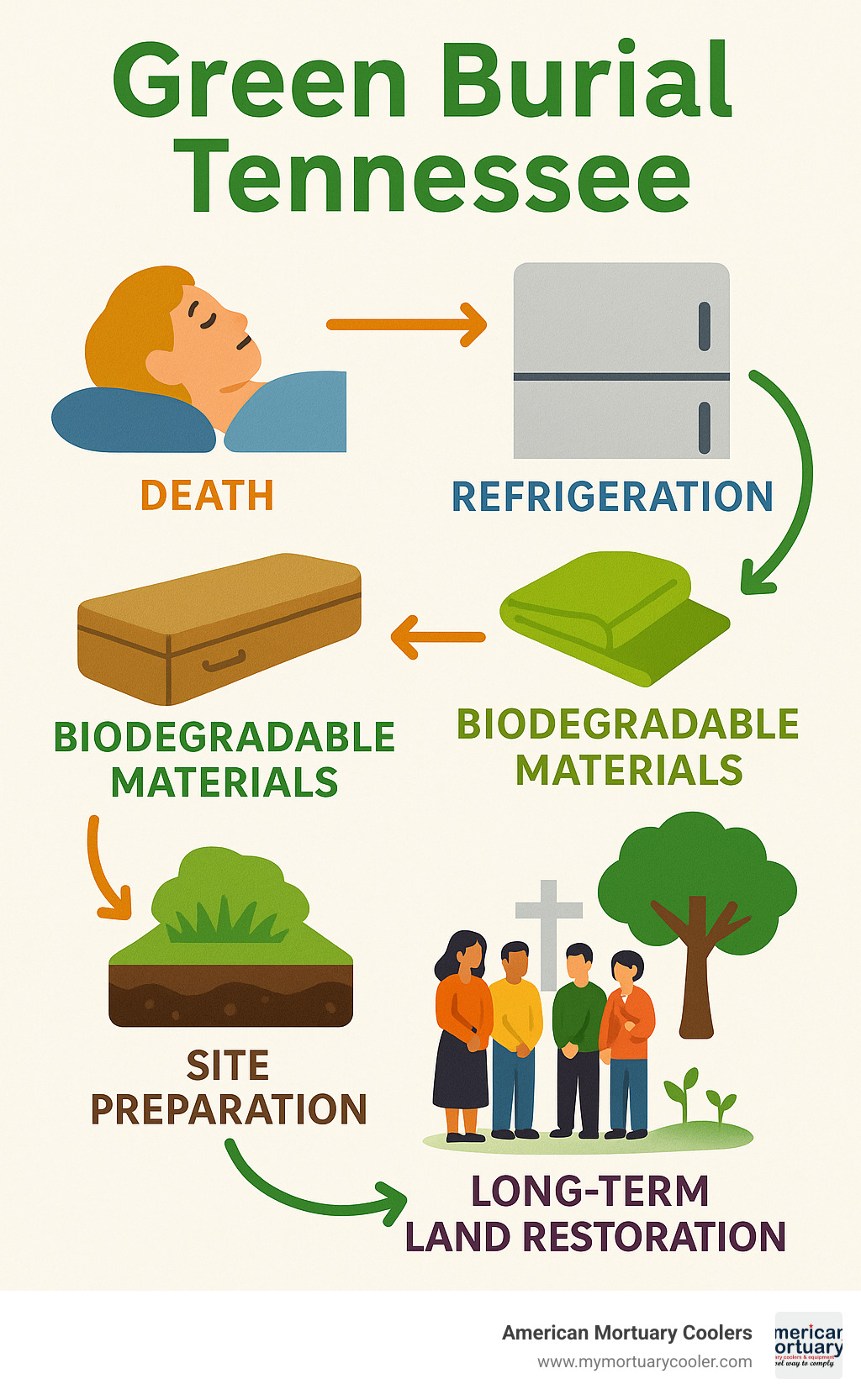
Green burial Tennessee terms at a glance:
What Is a Green Burial & Why It Matters
Green burial Tennessee practices represent a return to how we once honored our loved ones - naturally and simply. Instead of fighting against nature with chemicals and concrete, green burial works with the earth's natural cycles.
For thousands of years, humans were buried in simple shrouds or wooden boxes that allowed them to return to the soil. It's only in the last century that we've introduced embalming chemicals, steel caskets, and concrete vaults into the process.
Conventional burial relies on formaldehyde-based embalming fluid - a known carcinogen that can persist in groundwater for years. Bodies are placed in metal caskets, then sealed inside concrete vaults that prevent any natural decomposition.
Green burial takes a completely different approach. Bodies are preserved through refrigeration rather than chemicals, wrapped in simple shrouds or placed in biodegradable caskets made from materials like wicker, pine, or cardboard. No concrete vaults are used, so natural decomposition can enrich the soil and support local ecosystems.
Modern mortuary cooling systems can maintain bodies at optimal temperatures for weeks. This gives families plenty of time to plan meaningful ceremonies without needing toxic preservation chemicals.
Environmental Benefits at a Glance
The environmental impact of choosing green burial Tennessee options is significant when you see the numbers.
Every single year, conventional U.S. funerals consume enough resources to build a small city. We're talking about 20 million board feet of hardwood - that's enough lumber for thousands of homes. Add in 64,500 tons of steel and 4.3 million gallons of embalming fluid, and you start to see the scale.
Green burial eliminates all of that. Instead of consuming resources, conservation burial grounds actually improve wildlife habitat while protecting land from development. These sites become thriving ecosystems with native plantings that support pollinator populations.
The carbon savings are substantial too. Cremation requires maintaining temperatures of 1,900°F for over two hours, releasing 139-250 pounds of CO₂ per person. Green burial has virtually no carbon emissions, and conservation sites actually sequester carbon through forest restoration.
U.S. cemeteries bury enough concrete vaults each year to pave a two-lane road from New York City to Detroit. Green burial eliminates that environmental cost entirely while often creating more meaningful experiences for grieving families.
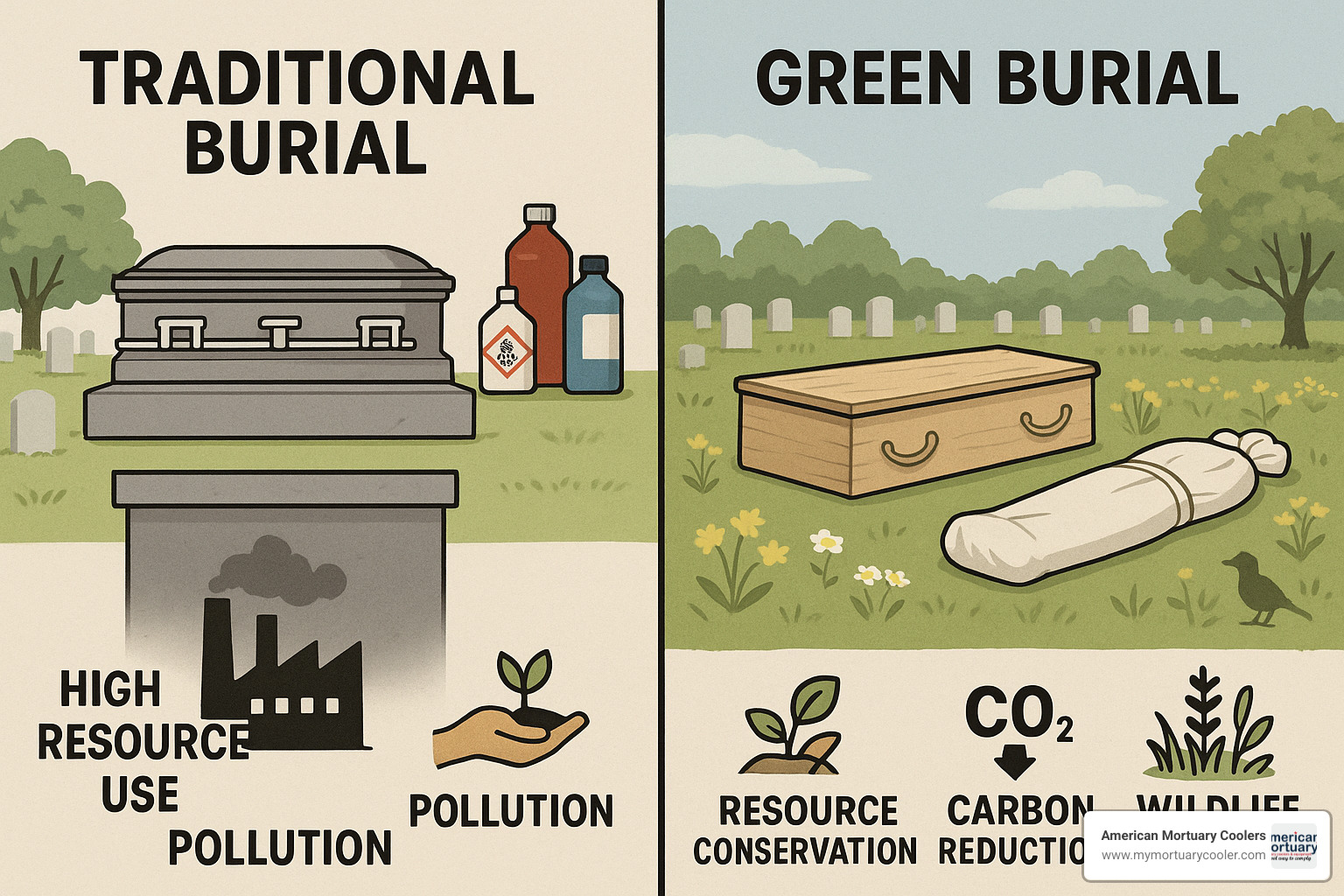
Green Burial Tennessee: Types, Sites & Certification
Green burial Tennessee options are fully legal statewide, though local land-use regulations may vary by county. The movement has gained structure through the Green Burial Council, which certifies burial sites under three distinct categories.
Natural burial grounds focus on biodegradable materials and prohibit embalming, but they might allow some conventional practices alongside green burials.
Hybrid cemeteries represent a middle ground that many Tennessee families find appealing. These are traditional cemeteries that have dedicated sections specifically for green burial. Elmwood Cemetery in Memphis and Maury Memorial Gardens in Columbia both offer this approach.
Conservation burial grounds set the gold standard for environmental impact. These sites must follow strict protocols that actively restore and protect local ecosystems. They're protected through conservation easements and managed by recognized land trusts, ensuring the land remains wild forever.
Tennessee hosts some of the most innovative Green Burial Cemeteries in the US and Canada. What makes our state special is having Larkspur Conservation - one of only about 20 conservation burial sites nationwide.
Larkspur Conservation—Tennessee's First Conservation Burial Ground
Nestled in Taylor Hollow, Sumner County, Larkspur Conservation spans 112 acres of mixed mesophytic forest - one of the South's most biodiverse ecosystems. This site opened in 2018 on former farmland owned by Dr. Russell Ward, now protected forever through a conservation easement with The Nature Conservancy.
Since opening, Larkspur has conducted 170 burials and has several hundred more families who've pre-purchased sites. Each burial location gets marked with GPS coordinates and recorded in a genealogical archive.
What sets Larkspur apart is how deeply families can participate in the burial process. Many families help lower caskets or shrouded bodies into graves that staff have lined with moss and native flowers. After placement, family members often take turns covering the grave with soil that's been mixed with seeds from native plants. Then they plant native grasses that will gradually integrate the burial site into the surrounding meadow ecosystem.
The site's commitment to active restoration makes it truly special. Staff continuously remove invasive species and plant native flora specifically chosen to support local wildlife populations. Over time, individual burial sites become completely indistinguishable from the surrounding forest and meadow.
Other Green Burial Tennessee Locations to Know
Narrow Ridge Natural Burial Preserve in Grainger County takes a donation-based approach. They believe that "the death of a loved one should not result in debt or financial hardship for family members." This 5-acre preserve offers families the option to hand-dig graves themselves, or they can hire a backhoe operator for just $300.
The community-focused philosophy at Narrow Ridge creates a unique experience. There's no set fee for burial plots - families simply donate what they can afford. The preserve provides a timber frame pavilion for memorial services and actively encourages families to participate directly in every aspect of the burial process.
Elmwood Cemetery in Memphis and Maury Memorial Gardens in Columbia serve as Green Burial Council-certified hybrid cemeteries. These sites offer dedicated green burial Tennessee sections within traditional cemetery grounds.
Tennessee law also permits burial on private family land, provided you follow local zoning regulations and maintain proper setbacks from water sources.
Burial of Cremated Remains & Memorial Choices
Green burial Tennessee sites welcome cremated remains. At Larkspur Conservation, burial of cremated remains costs $2,000 and includes all the same services as traditional burial: grave opening and closing, GPS mapping, genealogical archiving, and contributions to both perpetual care and conservation funds.
The Ashes to Earth: The Complete Guide to Biodegradable Urns resource explains the various options available for cremated remains burial. Families can choose from biodegradable urns crafted from materials like compressed peat, recycled paper, or salt that dissolve naturally in soil over time.
Memorial options at green burial sites reflect the natural aesthetic these spaces cultivate. Native stone markers cost around $750 at Larkspur and are sourced locally. Living memorial plantings ($300) use native species carefully selected to improve local biodiversity.
Some families choose to forgo any permanent marker at all, allowing the burial site to blend completely into the natural landscape. GPS coordinates ensure the location can always be found.
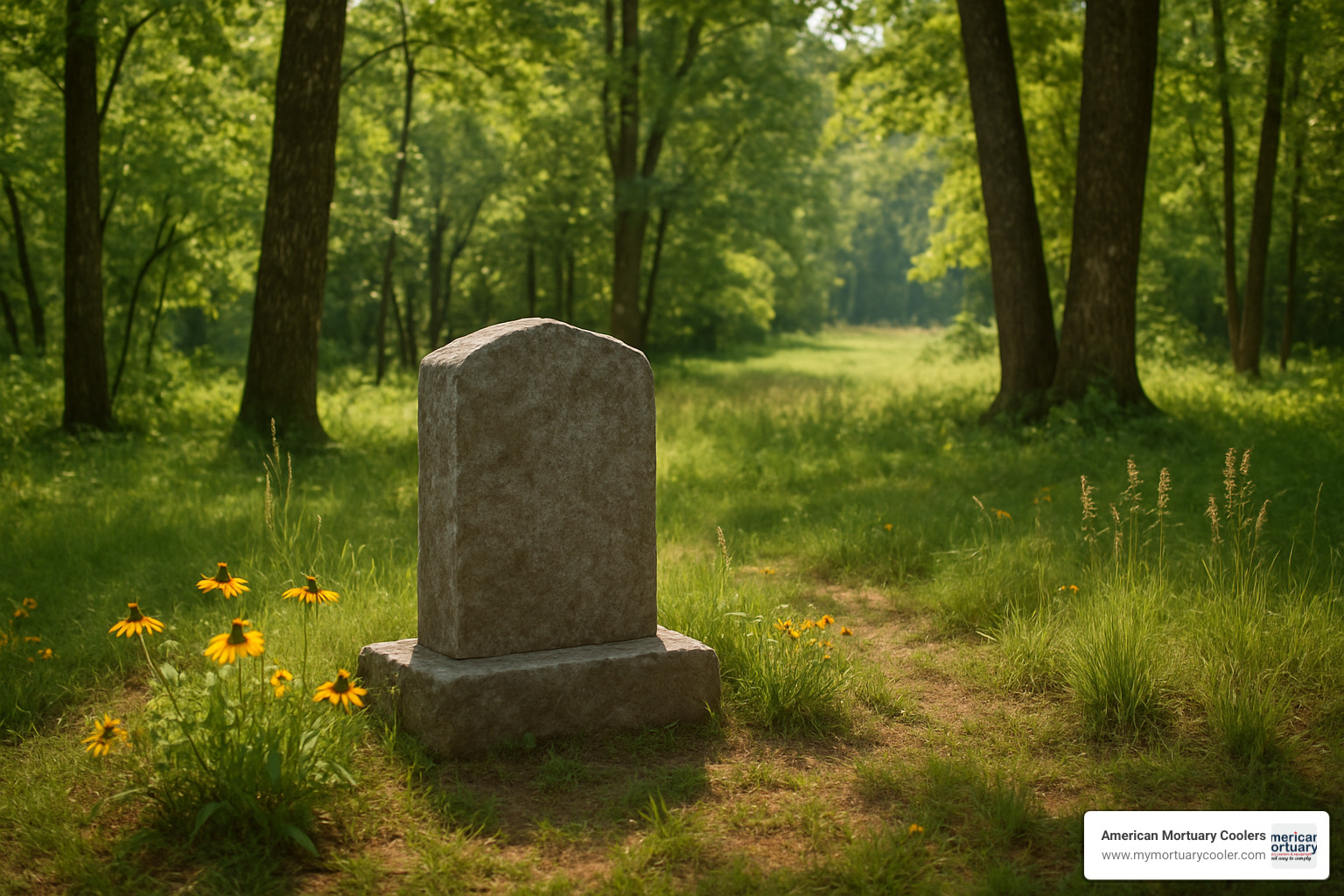
Planning, Permits & Legal Requirements for a Green Burial in Tennessee
Planning a green burial Tennessee doesn't require jumping through bureaucratic hoops, but understanding the basics helps everything go smoothly when your family is already dealing with loss.
Tennessee law makes green burial straightforward. The state doesn't require embalming for burial, which removes one of the biggest barriers to natural burial. You won't need special permits or certificates beyond what any burial requires.
However, timing does matter. If burial needs to be delayed more than a week, bodies must be properly refrigerated to meet public health standards. This is where proper mortuary cooling becomes essential.
Tennessee's Standards: Maintaining Dignity Through Proper Mortuary Cooler Storage explains exactly what funeral directors need to know about temperature control for green burial services.
Death certificates still need to be filed by a licensed funeral director or physician. While Tennessee law doesn't require you to use a funeral home, many families find it helpful to work with directors who understand green burial. Phillips-Robinson Funeral Home, for example, is the only funeral home in Middle Tennessee certified by the Green Burial Council.
If you're bringing a loved one from another state for green burial Tennessee, you'll need transit permits for crossing state lines. Within Tennessee, no special permits are required for moving bodies between locations.
The beauty of green burial planning is its flexibility. Unlike conventional funerals that often feel rushed into a 2-3 day timeline, green burial can happen anywhere from 24 hours to several weeks after death, depending on your family's needs and refrigeration arrangements.
Step-by-Step Checklist for Families
Before death occurs, visit potential burial sites and understand your options. Talk with family members about wishes and consider pre-purchasing burial rights if a particular location feels right.
When death occurs, notify your chosen burial site immediately and arrange for proper refrigeration if you're not using embalming. This is also when you'll start the death certificate process and contact a funeral home if you're using professional services.
During burial preparation, you'll select a biodegradable casket or shroud, plan ceremony details, and coordinate transportation to the burial site. Most importantly, prepare your family for what can be a deeply meaningful participatory experience.
On the day of burial, many families participate in a memorial procession to the burial site, help lower the casket or shrouded body, take part in covering the grave with soil, and plant native species or place natural markers.
Land Trusts & Conservation Easements
One of the most remarkable aspects of conservation burial is how your family's choice contributes to permanent land protection. At Larkspur Conservation, The Nature Conservancy holds a conservation easement that protects all 112 acres forever.
This legal protection means that burial fees support both immediate burial services and long-term conservation. Even if ownership of the burial ground changes hands someday, the land itself can never be developed or used for anything other than conservation.
The Nature Conservancy's involvement brings real scientific expertise to land management decisions. Professional ecologists monitor biodiversity, track restoration progress, and guide decisions about native plantings and invasive species removal.
Cost, Logistics & Family Experience
When considering green burial Tennessee options, families often find that choosing an environmentally conscious farewell can actually save money while creating a more meaningful experience. The costs vary between sites, but most families find green burial significantly more affordable than conventional options.
At Larkspur Conservation, traditional natural burial costs $4,000, while burial of cremated remains runs $2,000. Optional additions include a natural cloth shroud for $1,000, native stone memorial for $750, and living memorial planting for $300. These prices include grave opening and closing, GPS mapping, genealogical archiving, and contributions to perpetual care and conservation funds.
Narrow Ridge Preserve takes a different approach with their donation-based model, believing that "the death of a loved one should not result in debt or financial hardship for family members." Families pay what they can afford, with only the grave opening costing a set $300 if they choose not to hand-dig themselves. Their linen shrouds cost $385.
The savings become clear when you compare these costs to conventional burial. The average U.S. casket burial costs $7,848, while cremation averages $6,970. The Downes family, featured in a recent magazine article, paid $6,130 total for their green burial at Larkspur - substantially less than conventional alternatives while supporting important conservation work.
| Burial Type | Average Cost | Environmental Impact | Family Participation |
|---|---|---|---|
| Traditional Burial | $7,848 | High (chemicals, metals, concrete) | Limited |
| Cremation | $6,970 | Medium (CO₂ emissions, energy use) | Limited |
| Green Burial | $2,000-$6,130 | Positive (habitat restoration) | High |
Real-Life Stories from Tennessee Families
The most powerful aspect of green burial often isn't the cost savings - it's the healing experience families describe. Bobby Downes' story perfectly captures this change. Before his mother's death, he visited Larkspur Conservation and felt drawn to the conservation burial concept. When the family went to select a burial site, a butterfly appeared and seemed to guide them to a particular spot in the meadow - a moment they interpreted as a message from their loved one.
During the burial ceremony, the Downes family participated in lowering the wicker casket into a grave beautifully lined with moss and native flowers. They took turns shoveling soil back into the grave, soil that was naturally scented with native plants. Then they planted native grasses that would eventually make the burial site blend seamlessly into the surrounding meadow.
At Narrow Ridge, another family chose to hand-dig their loved one's grave themselves, finding the physical labor surprisingly therapeutic. As one family member explained, "The participatory aspect of green burial creates a more healing way to grieve because family members can physically participate in the burial ritual."
These stories highlight how green burial Tennessee transforms death from something done to families into something they actively participate in. Instead of standing aside while professionals handle everything, families become part of the process, creating deeper connections and more meaningful closure.
Budget Tips & Pre-Planning
Several strategies can make green burial even more accessible for Tennessee families. Narrow Ridge's donation-based model makes burial possible regardless of financial circumstances - families simply give what they can afford.
DIY options offer significant savings. Families can hand-dig graves, make their own shrouds from natural materials, or choose simple wooden caskets over elaborate options. Some families find these hands-on approaches more meaningful than purchasing expensive add-ons.
Pre-planning through Plan Ahead — Larkspur Conservation allows families to purchase burial rights in advance, locking in current prices and ensuring their wishes are clearly documented. This removes difficult decisions from grieving family members during an already challenging time.
Nonprofit assistance may be available through Larkspur Conservation's 501(c)3 status. They sometimes offer financial help to families for whom green burial would otherwise be unaffordable.
Eliminating optional extras like shrouds, stone markers, or professional grave opening can reduce costs while maintaining all the environmental benefits. The base burial fee at Larkspur includes everything necessary - GPS mapping, genealogical archiving, and contributions to perpetual care and conservation funds that would cost extra at conventional cemeteries.
Understanding what's included versus what's optional helps families make informed decisions. The goal is creating a meaningful farewell that honors both your loved one and your budget, while contributing to Tennessee's beautiful conservation landscapes.
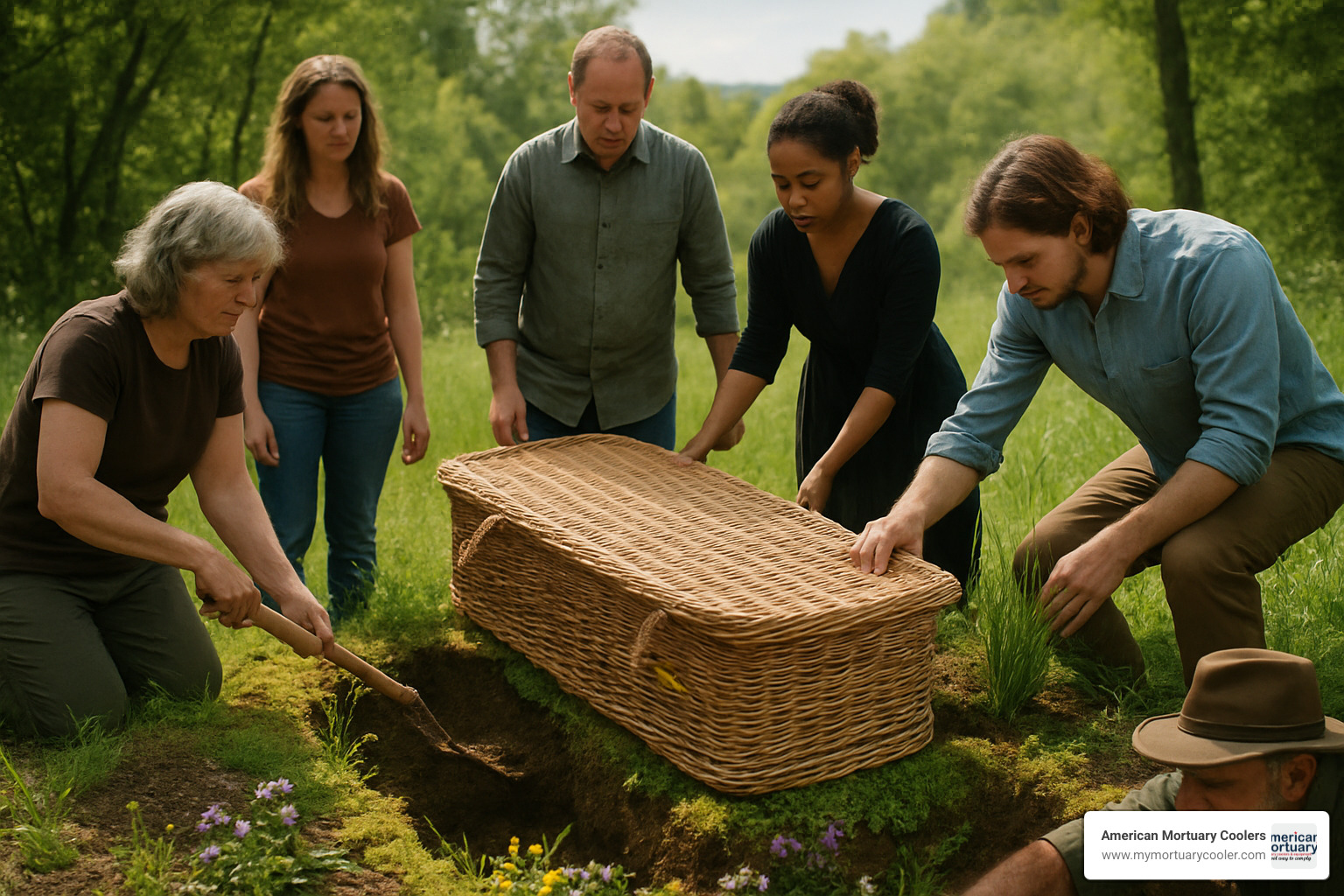
How Conservation Burial Restores Tennessee Landscapes
When you visit a green burial Tennessee conservation site today, you're witnessing an active restoration project that will continue evolving for decades. These aren't just burial grounds - they're living laboratories where death becomes part of nature's renewal cycle.
At Larkspur Conservation, the change is remarkable. What was once degraded farmland is slowly becoming the mixed mesophytic forest that originally covered much of Middle Tennessee. This ecosystem type is one of the most biodiverse in North America, supporting everything from rare wildflowers to migrating songbirds.
The restoration work begins long before the first burial. Staff spend months removing invasive species like autumn olive and multiflora rose that crowd out native plants. They replace these invaders with native trees, shrubs, and wildflowers carefully selected to recreate the original forest community.
Pollinator meadows are particularly important to the restoration process. Native grasses and wildflowers like rattlesnake master and purple coneflower provide nectar for bees, butterflies, and other pollinators throughout the growing season. These meadow areas also serve as transition zones between burial sites and mature forest.
Each burial contributes directly to the restoration effort. As bodies decompose naturally, they enrich the soil with nutrients that support plant growth. The native plantings around burial sites create small habitat patches that gradually expand and connect with other restored areas.
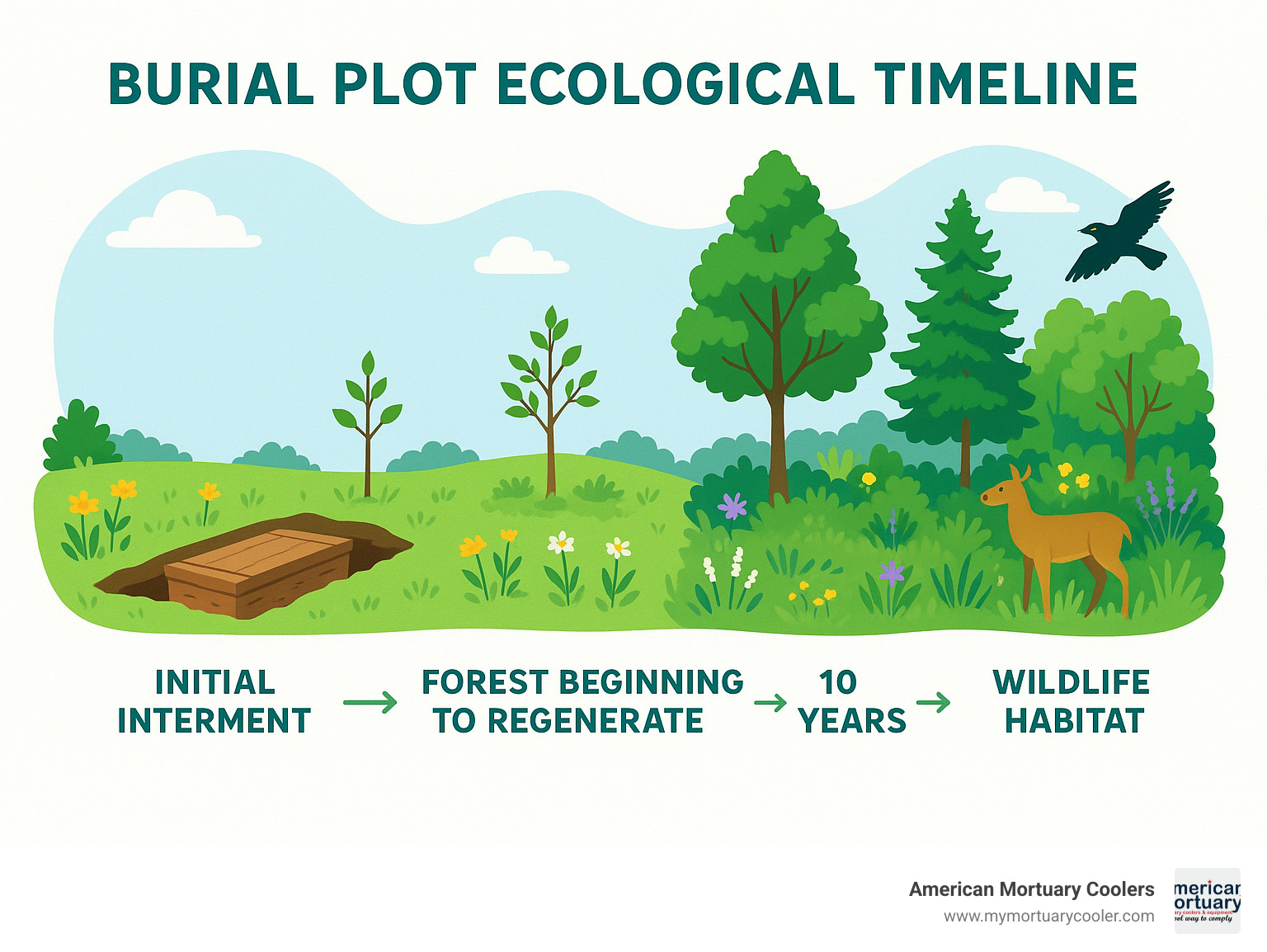
The Nature Conservancy brings scientific rigor to the restoration process. Professional ecologists conduct regular biodiversity surveys, monitoring which species are returning to the site. They track soil health improvements and test water quality to ensure the restoration is proceeding as planned.
Wildlife responds quickly to habitat improvements. Bird species that hadn't been seen on the property for decades are returning as the forest matures. Small mammals find shelter in brush piles left from invasive species removal. Even the soil comes alive with beneficial microorganisms that support plant growth.
Perhaps most remarkably, burial sites gradually disappear into the landscape. Within five to ten years, former burial locations become indistinguishable from the surrounding forest. Native plants establish themselves, leaf litter accumulates, and the forest floor returns to its natural appearance.
This creates a living memorial that grows more beautiful and ecologically valuable each year. Families visiting burial sites often comment on how peaceful it feels to know their loved one is contributing to habitat restoration that will benefit wildlife for generations.
The monitoring data tells an encouraging story. Species counts increase year by year as the ecosystem matures. Soil tests show improving organic matter content and reduced compaction. Water quality measurements demonstrate that natural burial poses no threat to groundwater systems.
This scientific approach ensures that conservation burial grounds truly function as wildlife habitat rather than simply green-looking cemeteries. The land becomes more valuable for conservation purposes with each passing year, creating a permanent legacy that extends far beyond individual burials.
Frequently Asked Questions about green burial Tennessee
Is green burial legal across Tennessee?
Green burial Tennessee is completely legal throughout the state. Tennessee's laws actually make natural burial quite simple - there's no requirement for embalming, metal caskets, or concrete burial vaults. This means families can choose eco-friendly options without worrying about breaking any rules.
The state recognizes that traditional burial practices involving chemicals and non-biodegradable materials are choices, not legal requirements. Local zoning regulations might apply if you're considering burial on private land, but certified green burial sites like Larkspur Conservation and Narrow Ridge have already steerd these requirements successfully.
What's particularly helpful is that Tennessee doesn't require special permits for green burial. The same death certificate and transportation requirements apply whether you choose conventional or natural burial methods.
How long after death must a green burial occur?
Tennessee law gives families flexibility with timing, which is especially important for green burial Tennessee services since families often want time to plan meaningful ceremonies. If burial happens within a few days, simple refrigeration maintains the body naturally without any chemical intervention.
For longer delays, proper refrigeration becomes essential. We've worked with funeral homes across Tennessee to maintain bodies for weeks using professional cooling systems, giving families time to gather from distant locations or plan elaborate ceremonies without resorting to embalming.
The key is having reliable refrigeration equipment. As American Mortuary Coolers, we've seen how proper temperature control allows families to take their time with green burial planning while maintaining dignity and public health standards. Some families use this flexibility to coordinate with seasonal considerations - choosing spring burials when wildflowers are blooming or fall ceremonies when leaves are changing.
Can I have a religious or personalized ceremony?
Absolutely, and this is where green burial really shines. Green burial Tennessee sites welcome all types of ceremonies - from traditional religious services to completely personalized celebrations of life. The natural settings often improve spiritual experiences rather than limiting them.
Many families find that outdoor ceremonies feel more connected to their faith traditions. Some hold services at their home church or funeral home first, then proceed to the burial ground for a more intimate interment ceremony. Others conduct everything outdoors, using the natural beauty of meadows and forests as their sanctuary.
The participatory nature of green burial allows for deeply personal rituals. Families might incorporate readings from favorite books, play meaningful music, or include cultural traditions that reflect their heritage. We've heard stories of families singing hymns while hand-digging graves, sharing memories while covering the burial site with native soil, or planting memorial trees as part of their ceremony.
The flexibility extends to timing too. Some families hold sunrise services, others prefer sunset ceremonies, and some choose to bury during meaningful seasons or anniversaries. Green burial sites accommodate these personal touches because they understand that healing happens differently for everyone.
Conclusion
Choosing green burial Tennessee creates a legacy that honors loved ones while healing the land. Families repeatedly tell us that natural burial feels authentic, peaceful, and deeply comforting.
With more than 170 burials already completed at Larkspur and hundreds of pre-plans in place, Tennessee now leads the national conservation-burial movement. Every interment restores native habitat, locks land into permanent protection, and avoids the metals, concrete, and chemicals of conventional funerals.
As more funeral directors accept natural options, American Mortuary Coolers is proud to supply the custom refrigeration that makes chemical-free preservation practical. Our durable, Tennessee-built coolers let funeral homes offer earth-friendly services without sacrificing dignity or flexibility.
If this path speaks to you, start visiting sites, talking with staff, and documenting wishes now. A little preparation spares families difficult decisions later and ensures your farewell matches your values.
Your choice matters—for your family, for wildlife, and for the future of Tennessee’s beautiful landscapes. To dig deeper into sustainable death-care planning, explore our An Essential Guide to Eco-Friendly Funeral Options.



















